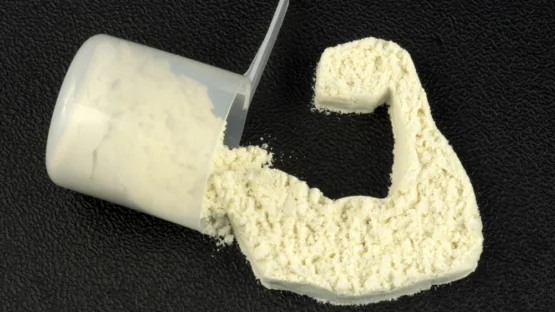Researchers publishing in Age and Ageing have found that, rather than being protective, an increase in dietary protein is associated with an increased chance of sarcopenia.
Sarcopenia is a well-known disorder that occurs with aging. People with sarcopenia lack adequate muscular function, leading to frailty, a higher risk of falls, and a functional decline in daily living activities that leads to a decreased quality of life [1].
Previous research into the relationship between protein consumption and sarcopenia has noted the phenomenon of anabolic resistance, in which muscle protein is more difficult to synthesize in older adults [2]. Therefore, the European Society for Clinical Nutrition and Metabolism (ESPEN) recommends that older adults consume 1 to 1.3 grams of protein per kilogram of body weight a day [3].
Muscle strength, muscle mass, and sarcopenia
This study used data from the TwinsUK cohort, a registry of almost 15,000 fraternal and identical twins and triplets [4]. This study chose community-dwelling older adults that had detailed muscular data available; this was a subgroup of 3,302. There were no exclusionary factors.
As is usual for this kind of study, there were a substantial number of confounding factors, many of which were related to one another. While aging is, of course, the primary association, education, BMI, and income were all found to have associations with muscle strength, muscle mass, and sarcopenia.
There was no significant association between muscle strength and protein intake one way or another. However, protein intake below the ESPEN recommendations was, to the researchers’ surprise, significantly correlated with a reduced incidence of low muscle mass and sarcopenia. Similarly, protein intake in excess of the ESPEN recommendations was correlated with a greater risk of low muscle mass and sarcopenia.
These results were confirmed when twins were examined against one another. Shared twin factors, such as genetics and early life history, did not meaningfully change the statistical relationship between protein intake and sarcopenia. Other multivariable analysis models also confirmed these findings.
Analysis
The researchers considered multiple potential reasons behind these findings. One of them is the idea that the causality might be reversed: that people who suffer from sarcopenia may be consuming more protein in an effort to treat the condition. The researchers find this to be unlikely, as sarcopenia is seldom diagnosed [5].
They also note that dietary studies that did not focus on protein, but rather on higher consumption of fruits and vegetables, showed an association with higher grip strength [6]. Diets that are high in protein might also be high in inflammatory or other negative factors that promote sarcopenia, so it might be the source of protein that is the root cause of these results.
Conclusion
While this study was biased towards healthy volunteers, it offers highly contrary evidence to the conventional wisdom surrounding protein and sarcopenia, and it may result in re-evaluations of ESPEN and other dietary health guidelines. This is an association study that does not prove causation, but it makes it clear that simply eating more protein is not likely to protect anyone against developing sarcopenia. Exercise may be somewhat effective in fighting back against this disease, but more fundamental biological interventions are likely to be required to prevent it for good.
Literature
[1] Cruz-Jentoft, A. J., Bahat, G., Bauer, J., Boirie, Y., Bruyère, O., Cederholm, T., … & Zamboni, M. (2019). Sarcopenia: revised European consensus on definition and diagnosis. Age and ageing, 48(1), 16-31.
[2] Welch, A. A. (2014). Nutritional influences on age-related skeletal muscle loss. Proceedings of the Nutrition Society, 73(1), 16-33.
[3] Deutz, N. E., Bauer, J. M., Barazzoni, R., Biolo, G., Boirie, Y., Bosy-Westphal, A., … & Calder, P. C. (2014). Protein intake and exercise for optimal muscle function with aging: recommendations from the ESPEN Expert Group. Clinical nutrition, 33(6), 929-936.
[4] Verdi, S., Abbasian, G., Bowyer, R. C., Lachance, G., Yarand, D., Christofidou, P., … & Steves, C. J. (2019). TwinsUK: the UK adult twin registry update. Twin Research and Human Genetics, 22(6), 523-529.
[5] Avgerinou, C. (2020). Sarcopenia: why it matters in general practice. British Journal of General Practice, 70(693), 200-201.
[6] Robinson, S. M., Jameson, K. A., Batelaan, S. F., Martin, H. J., Syddall, H. E., Dennison, E. M., … & Hertfordshire Cohort Study Group. (2008). Diet and its relationship with grip strength in community‐dwelling older men and women: the Hertfordshire cohort study. Journal of the American Geriatrics Society, 56(1), 84-90.





